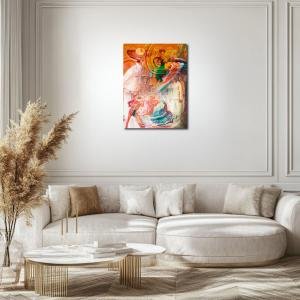The Grand Illusion: Festival of the Chessboard
"The Grand Illusion: Festival of the Chessboard" transforms Monet’s vibrant celebration into a surreal battleground of strategy and control. The festival-goers now exist upon a crumbling chessboard, their movements dictated by an unseen force. A shadowy magician looms over the scene, orchestrating the chaos while remaining part of it himself. The sky is split between dusk and dawn, representing the contrast between revelry and fate. The rich, warm colors of the festival stand in stark contrast to the cold blues of the chess pieces and board, highlighting the tension between joy and inevitability. The artwork asks a profound question: are we truly free, or are we simply playing roles in a larger, unknowable game?
Please see Below for Details…
Hotline Order:
Mon - Fri: 07AM - 06PM
404-872-4663
Claude Monet’s Festival at Argenteuil originally captured the vibrancy of a local celebration, where light, color, and human movement blended seamlessly in the Impressionist style. In this dadaist reimagination, the festive crowd has been transplanted onto a surreal chessboard, where reality warps, and the festival becomes a game of illusion, strategy, and fate.
The most striking element of this reinterpretation is the transformation of the ground into a chessboard—a battlefield of logic and unpredictability. The figures of Monet’s festival-goers remain, but they are now mere pieces in a grand game, their movements seemingly dictated by unseen forces. The juxtaposition of the lively gathering against the cold, calculated nature of chess creates a haunting contrast—does free will truly exist, or are we all just players in a predetermined game?
To the right, a mysterious figure looms—a magician-like presence, donning a top hat and extending his arms as if orchestrating the chaos. His form is fragmented, dissolving into the fabric of the world itself. He is both master and pawn, suggesting the cyclical nature of control—those who think they rule may themselves be ruled. Surrounding him, chess pieces hover mid-air, suspended in a state of movement yet frozen in time. Their shattered reflections on the board suggest an impending checkmate, a moment of revelation that is inevitable.
The background sky is split between dusk and dawn—one side painted in golden hues of sunset, the other in deep blues and grays of an approaching storm. This duality represents the tension between celebration and conflict, between illusion and reality. The water’s edge, once a peaceful boundary in Monet’s original work, now merges with an abstract, dreamlike space where the chessboard extends infinitely, its edges crumbling into oblivion.
The use of color is pivotal in evoking the dreamlike quality of this piece. The warm tones of the festival—gold, soft pink, and deep green—contrast starkly against the cold blues and blacks of the chessboard’s rigid geometry. Monet’s signature impressionistic dabs of light and shadow remain, but they have been fractured, almost glitching between different planes of existence. The golden glow around the magician figure hints at deception—light that both illuminates and blinds, concealing the truth behind its dazzling display.
As an artist, my goal in reimagining this work was to explore the unpredictability of life’s celebrations. What was once a simple town festival is now an allegory for the intricate dance of existence, where joy is interwoven with control, and every step taken is dictated by unseen hands. The chessboard is symbolic of fate—the illusion of choice when, in reality, every move is leading toward an inevitable conclusion. The magician, perhaps a figure of destiny or deception, invites us to question whether we are participants in our own lives or merely spectators.
The festival-goers, despite their placement within the chessboard’s confines, remain engaged in their revelry. They are aware of the game yet refuse to acknowledge it. This speaks to human resilience—despite the structures and systems that confine us, we continue to dance, to celebrate, to live. It raises a question: is ignorance bliss, or is awareness the only path to true freedom?
This piece challenges the viewer to look beyond the surface, to see the hidden patterns in chaos, to acknowledge the beauty in uncertainty. Monet’s Festival at Argenteuil once captured a fleeting moment of joy; now, it exists in a perpetual state of movement and manipulation, an endless game where every move has already been decided.
Add your review
Your email address will not be published. Required fields are marked *
Please login to write review!
Looks like there are no reviews yet.








